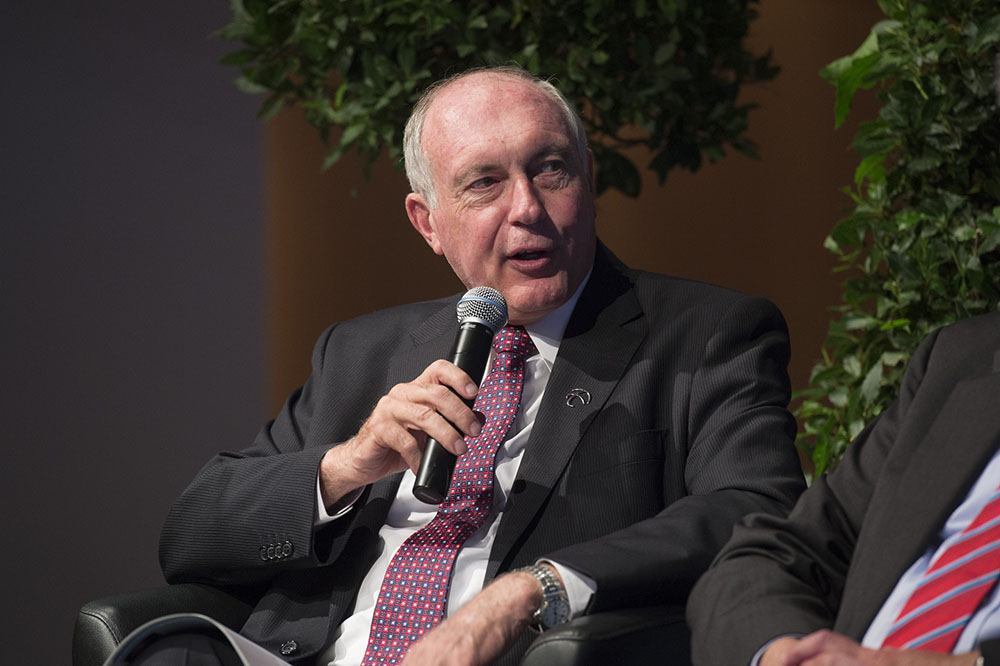
Image: Deputy Prime Minister and Minister for Infrastructure and Regional Development Warren Truss.
When Deputy Prime Minister and Minister for Infrastructure and Regional Development Warren Truss fronted an audience of local government professionals, he was a good sport for taking questions.
At the Australian Local Government Association’s (ALGA) annual National General Assembly 2015 in Canberra, Mr Truss spoke about the federal government’s ambitious investments into the Roads to Recovery scheme and white papers on Federation and taxation reform, as well as building a stronger Australia.
But speaking to an audience comprised of local government delegates made it hard for Mr Truss to ignore the elephant in the room, which was the Coalition’s unpopular decision to pause indexation on Financial Assistance Grants (FAG) in the 2014-15 Budget.
This pause was maintained in the 2015-16 Budget, although Mr Truss said this Budget “demonstrates the government’s continued commitment to working with councils right across Australia to deliver the infrastructure and services you require for a more prosperous community”.
Mr Truss acknowledged the unpopularity of the pause on indexation, but he assured that “it’s not one we wanted to make”.
The pause was part of the Coalition’s wider plan for budgetary repair following the spending sprees of the previous Labor government, which Mr Truss said resulted in $123 billion of cumulative deficits, which the Coalition has brought down by about $40 billion.
Although he noted that “the pause is temporary, and councils will receive $9.45 billion across the forward estimates”, when question time came around, council representatives were still demanding that he show them the money.
They especially wanted to know what’s happening to big rail and public transport projects, since the federal government’s fixation on roads has created a deep lack of synergy with the demands of local government.
City of Whitehorse Mayor Andrew Munroe asked about whether the federal government’s $1.8 billion for urban rail projects has been slated for metropolitan Melbourne.
Mr Truss answered that there was a major road project in Melbourne, the east-west link, which had been cancelled by the Victorian government.
He said that the government has asked that the Victorian government give back the money for that project and “we are talking with them about how we may be able to engage in other important infrastructures in Melbourne”.
“We were taken aback by the cancellation of the east-west project for all sorts of reasons, but in particular, it was the biggest project in the state and one of the biggest projects in Australia,” Mr Truss said
He said it was going to be an important part of the government’s wish to use construction of infrastructure to create jobs, and boost the economy at a time when the mining boom and construction of new mining projects has slowed.
But the big question came from a local government representative from Blacktown City Council in New South Wales, who asked what is happening with railway lines and high speed rail around the new Badgerys Creek airport in the west of Sydney.
Mr Truss said the government has committed with New South Wales $3.6 billion worth of roads designed to support the fast growing population in the area to ensure that there’s infrastructure that can meet the thousands of new homes being built.
He argued that you can’t justify the railway line on the basis of urban population growth in those surrounding suburbs.
Mr Truss was more flippant in reference to the High Speed Rail, which has been stuck in limbo since the election of the Coalition in 2013.
He joked that if you go to the High Speed Rail website, “you can actually see that it’s going through your house or your neighbours”.
But he argued that the project was unfeasible because not only would the construction start in about 2025 and be completed in about 2063, the cost of the project was estimated to be about $114 billion.
“Frankly I think that’s conservative. I think it would be the best part of $1 trillion,” Mr Truss said.
He said “that is a heck of a lot of money and will be therefore difficult to finance and to run profitably”.
According to Mr Truss, he regularly gets visits from people from Japan, China or Korea volunteering to build the train.
“There is no problem in getting people to build it. None of them however are prepared to share in the financial risk, and the financial risk is huge for that project,” Mr Truss said.
However, he said that it’s a project that the government needs to continue to address and that he’s talking to the states about the need to reserve the corridor.
“And even that is a multi-billion dollar decision, because once you identify a corridor, you’ve got to be prepared to buy the land, so even that is a big decision. So far, I haven’t seen much enthusiasm from the states, but we’ll continue to talk,” Mr Truss said.





